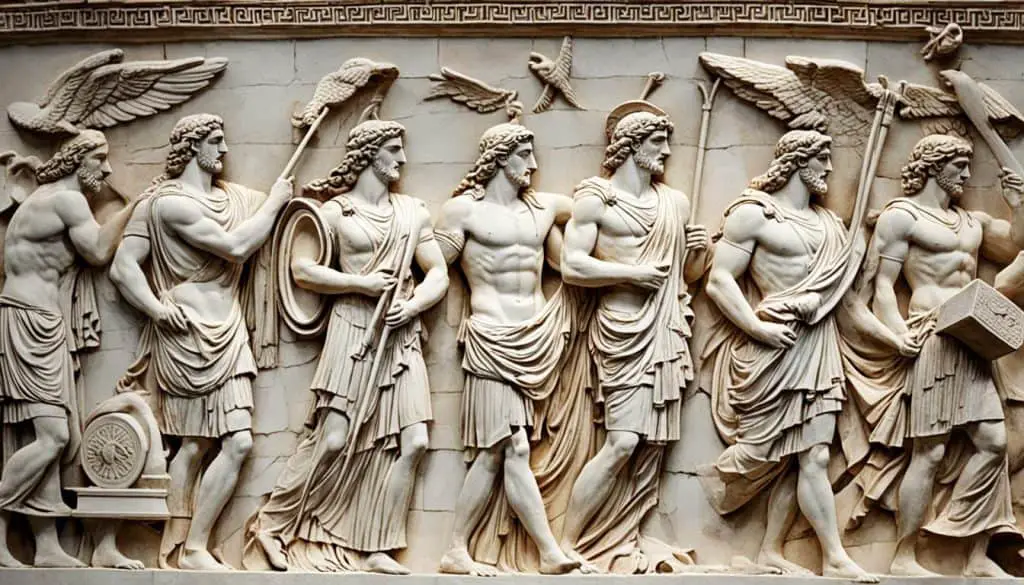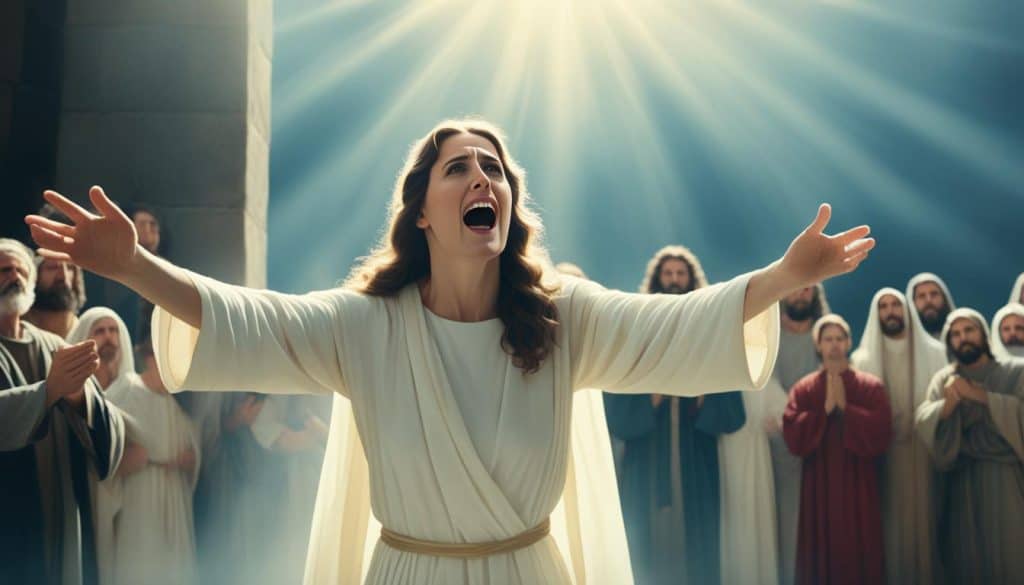Table of Contents
Have you ever thought about the different people in the New Testament who weren’t Jewish? Who were they? What were their stories? Let’s dive into the tales of these non-Jewish groups in the New Testament. We’ll see how they fit into the big picture and what they bring to the story.
From Romans to Greeks, and even Syrophoenicians, each group had its own beliefs and practices. They played a big role in how the New Testament story unfolded. Their experiences help us understand the time better.
So, who were these non-Jewish groups? And just how important were they to the early Christians? Come with us on a journey. Let’s explore their stories. They add depth and complexity to the New Testament. We’re about to uncover fascinating things.
Romans in the New Testament
The Romans were a big part of the New Testament. They ruled over lands, collected taxes, and had strong armies. This influence is seen in stories like in Luke 23:1-7, Matthew 5:46-47, and Acts 10:1.
Their presence shows the historical backdrop of the New Testament stories. As rulers, they controlled places like ancient Judea. People there had to follow Roman laws and pay taxes.
“Render to Caesar the things that are Caesar’s, and to God the things that are God’s.” – Matthew 22:21
Roman taxes and tax collectors get mentioned a lot in the New Testament. For example, Matthew was once a tax collector. After meeting Jesus, Matthew changed his ways and followed him. This shows how everyone was welcomed into Jesus’ teachings, including those from different social classes.
Rome also kept a tight hold with their armies. Soldiers made sure Roman rules were followed and kept the peace. The New Testament talks more about these soldiers. It shows the tensions between the Jewish people and the Roman officials.
Even as a foreign power, the Romans’ story in the New Testament tells us a lot. It shows the challenges Jesus and his followers faced. We see how they interacted with Jewish leaders and dealt with Roman rule.
Stories between Jesus and Roman leaders show big conflicts. The clash between Jesus’ message and Roman power led to his death. These events highlight the struggle over authority.
Comparing Roman Rule with Other Groups
| Group | Characteristics |
|---|---|
| Romans | Dominant imperial power, rulers, tax collectors, military personnel |
| Samaritans | Distinct religious practices, theological differences with Jews |
| Herod Antipas and the Herodians | Tetrarch appointed by Rome, followers or supporters, involved in tax debates |
| Greeks | Influenced by Hellenistic culture and philosophy, seekers of knowledge, idol worship |
| Syrophoenicians (Canaanites) | Considered outside of God’s covenant, demonstrated remarkable faith |
| Ethiopians | High-ranking official eager to follow Jesus |
| Magi | Visitors from the east, possibly astrologers or priests, searching for the newborn Jesus |
| Proselytes | Gentiles converted to Judaism, foreshadowing inclusion in the early Christian movement |
Rome’s political and military might greatly shaped the New Testament. Their taxes, armies, and rule influenced the stories we read. Learning about them helps us understand the cultural and historical context of that time.
Samaritans and Their Theological Differences
The Samaritans were from Israelite and foreigner backgrounds. They stood out in the New Testament because of their unique religious views. Their practices and beliefs were different from those of the Jews.
They considered Mount Gerizim as crucial for their faith. The Samaritan temple was their holy place, not the Jerusalem temple. This was diverse from Jewish beliefs, marking a significant division.
In light of religious differences, the Samaritans and Jews often clashed. The Jews saw the Samaritans as outsiders, not sharing their view of religious correctness. Yet, the Samaritans showed commitment to spiritual growth despite these frictions.
The story of the Good Samaritan is a prime example. It highlights their deep understanding of compassion and kindness. This approach challenged the exclusive religious views of the time.
Differences in Theological Beliefs
One major difference was in their holy books. While Jews held the Torah as supreme, the Samaritans had their own version, the Samaritan Pentateuch. This Pentateuch included the same five books, showing a clear divide in faith.
They also differed in their Messianic beliefs. The Samaritans awaited the “Taheb,” seeing this figure as a community savior. This illustrates their unique expectations regarding the savior.
“Our fathers worshiped on this mountain, but you Jews claim that the place where we must worship is in Jerusalem.” – John 4:20
These theological gaps led to complex relations, creating strife. They are evident in the biblical interactions between Jesus and the Samaritans.

| Aspect | Samaritans | Jews |
|---|---|---|
| Place of Worship | Mount Gerizim | Jerusalem |
| Sacred Text | Samaritan Pentateuch | Torah |
| Messianic Expectations | “Taheb” – Restorer of Samaritan community | Messiah |
This table underlines the major religious differences between Samaritans and Jews in New Testament times.
Herod Antipas and the Herodians
In the New Testament, we learn about Herod Antipas. He was a tetrarch, a ruler under the Romans. His followers, the Herodians, supported him. They are in stories like the tax debate in Mark 8:15.
Herod Antipas was powerful in the time of Jesus. He was the son of Herod the Great. As a tetrarch, he ruled parts of Palestine and Galilee. This made him important in the New Testament’s social and political scenes.
“Render to Caesar the things that are Caesar’s, and to God the things that are God’s.” – Mark 8:15
Jesus talked about taxes in this well-known quote. It shows why Jews should pay Rome. It brings up the Herodians, who supported Herod Antipas. The debate questioned their loyalty and faith.
The New Testament uses tax talks to explain Roman control over Jewish life. By bringing up Herod Antipas and the Herodians, it shines a light on these issues.
| Key Points | References |
|---|---|
| Herod Antipas, a tetrarch appointed by Rome | Mark 8:15 |
| The Herodians, likely followers or supporters of Herod Antipas | Mark 8:15 |
| Debate about paying taxes to Rome | Mark 8:15 |
The Significance of Herod Antipas and the Herodians
Herod Antipas and the Herodians tell us about mixing politics, loyalty, and faith. They show how tough it was for Jews back then. They had to follow Rome’s rules but also keep their faith.
Studying what the Bible says about them gives us more than history. We understand Jesus’ and his disciples’ world better. It teaches us about life and faith in that time.
Greeks and Hellenistic Culture
In the New Testament, Greeks are key players in spreading Hellenistic culture and philosophy. Their deep love for intellectual pursuits greatly influenced the time’s culture. The Greeks’ interactions with New Testament teachings had a deep impact.
The Gospel of John shows Greeks seeking knowledge about Jesus. In John 12:20-21, some Greeks asked to meet Jesus through Philip. This event shows how Jesus’ message reached people beyond his immediate followers. It proves that Jesus’ teachings were universal, appealing to many cultures.
“Now among those who went up to worship at the feast were some Greeks. So these came to Philip, who was from Bethsaida in Galilee, and asked him, ‘Sir, we wish to see Jesus.’” – John 12:20-21
In Acts 17:16, Paul was in Athens and saw their many idols. The Greeks’ tradition of idol worship conflicted with monotheistic Christianity. It shows the difficulty Christians faced in cultures focused on idols.
“Now while Paul was waiting for them at Athens, his spirit was provoked within him as he saw that the city was full of idols.” – Acts 17:16
The Greeks’ role in the New Testament shows the varied cultural and philosophical scene then. It highlights how some Greeks were seekers of wisdom while others clung to idol worship, challenging Christianity.
Hellenistic Philosophy and its Influence
Hellenistic philosophy was all about using reason and seeking knowledge. The New Testament describes how it interacted with Greek philosophy. It shows the balance between Greek wisdom and Christian beliefs.
In Corinthians 1:18-25, Paul talks about the Greeks’ wisdom-seeking. He explains that the message of the cross, while puzzling to Greeks, is the core of salvation. This conversation underscores the contrast between human wisdom and divine truth.
“For the word of the cross is folly to those who are perishing, but to us who are being saved it is the power of God. … For Jews demand signs and Greeks seek wisdom, but we preach Christ crucified, a stumbling block to Jews and folly to Gentiles.” – Corinthians 1:18, 22-23
Paul’s discussion with the Greeks highlights a key message: faith in Christ overcomes human wisdom. The New Testament guides believers to trust in Christ, even against popular intellectual viewpoints.
Greeks in the New Testament: A Multifaceted Presence
Greeks in the New Testament played many roles, showcasing both their love for knowledge and their worship of idols. Their interactions with Christianity were varied and complex. The New Testament offers insights into how Greek culture merged with early Christianity.
When we study Greek influence in the New Testament, we learn a lot about the cultural and intellectual environment of that time. Their presence was much more than just a historical fact; it sheds light on the dynamic between Greek philosophy and Christian beliefs.

Syrophoenicians (Canaanites) and Remarkable Faith
In the New Testament, a woman from Syrophoenicia showed incredible faith in Jesus. It’s an inspiring story in the Gospel of Mark, chapter 7, verses 24 to 30. This region was seen as not within God’s covenant.
This woman asked Jesus to help her daughter, who was troubled by an evil spirit. She was a Canaanite, and her people were looked down upon. Yet, she truly believed in Jesus’ ability to heal. When Jesus seemed to brush her off, she still kept her faith. She compared herself to dogs who get the leftover food from the table. She didn’t demand much, just pleaded for a small miracle.
“Yes, Lord,” she replied, “but even the dogs under the table eat the children’s crumbs.”
Then Jesus said to her, “For such a reply, you may go; the demon has left your daughter.”
– Mark 7:28-29 (NIV)
This story shows how Jesus’ love isn’t limited by culture or tradition. Her belief was so strong that it saved her daughter. It’s a lesson in trusting Jesus, no matter who you are.
Jesus praised her because she truly trusted Him. He didn’t care that she was a Canaanite. He saw her faith and responded to it.
We should celebrate this woman’s story. It shows the limitless love and grace of Jesus. No background or culture can block us from accessing God’s miracles through faith.
| Key Points | Details |
|---|---|
| Syrophoenician Woman | A woman from the region of Syrophoenicia |
| Remarkable Faith | She exhibited extraordinary faith in Jesus |
| New Testament Reference | Mark 7:24-30 |
| Inclusivity of Jesus | Her encounter with Jesus highlights the inclusivity of His message |
| Power of Faith | Her remarkable faith led to the deliverance of her daughter |

Ethiopians and Zeal to Follow Jesus
In the New Testament, a high-ranking Ethiopian official shows great eagerness to follow Jesus. This story is in Acts 8:26-39. It tells about his journey to faith.
The high official was coming back from Jerusalem, where he prayed. He was reading from the book of Isaiah. At that very moment, Philip comes up to him by the Spirit’s guidance.
“Do you understand what you are reading?”
The official answers, “How can I, unless someone explains it to me?”
Philip then explains the Bible’s meaning, especially about Jesus. The official is so moved that he asks to be baptized right there and then:
“Here is water! What stops me from being baptized?”
Philip doesn’t hesitate. He baptizes the official. This act marks his step into the Christian faith. The official’s excitement and faith show nothing can get in the way, not even his high position or being Ethiopian.
This story highlights the early Christian movement’s welcoming nature. It shows how Jesus’ teachings can reach and change anyone, no matter their background.
Significance of the Ethiopian Eunuch
The Ethiopian eunuch is highlighted for seeking Jesus earnestly. This story underlines a key point—faith is for everyone, no matter who they are or where they come from.
Through the official’s story, we’re reminded that Jesus breaks down all barriers, inviting anyone, regardless of their status, to a life-changing faith.
Comparison of Non-Jewish Individuals’ Responses to Jesus
| Non-Jewish Individual | Response to Jesus |
|---|---|
| Ethiopian Eunuch | Displays eagerness to follow Jesus and seeks baptism |
| Greeks | Some seek knowledge about Jesus, while others worship idols |
| Syrophoenician Woman | Demonstrates remarkable faith in Jesus |
| Magi | Journey to find the newborn Jesus, guided by a star |
| Proselytes | Inclusion in the early Christian movement, following conversion to Judaism |
The table compares how different non-Jewish people in the Bible responded to Jesus’ teachings. It shows the varied ways they encountered and accepted the message.

The image shows the Ethiopian official and Philip. It captures the significance of their meeting, where the eunuch learns about Jesus. This picture highlights the eunuch’s eagerness to understand and accept the Christian faith.
Magi and the Search for the Newborn Jesus
The Magi, known as wise men, were from the east. They played a big part in the New Testament. In Matthew 2:1-12, we learn about their journey. They were looking for the newborn Jesus.

The Magi were experts in ancient wisdom, possibly astrologers or priests. They saw a special star at the birth of a king. They set off to honor the newborn Jesus.
“Where is the one who has been born king of the Jews? We saw his star when it rose and have come to worship him.” – Matthew 2:2
With strong faith, the Magi covered a long distance. They used astrology and ancient texts to find Jesus. They first arrived in Jerusalem, asking Herod about the newborn king.
“Where is the one who has been born king of the Jews? For we saw his star when it rose and have come to worship him.” – Matthew 2:2
Herod’s advisers showed the Magi to Bethlehem, as Micah 5:2 foretold. The wise men saw the star again and found Jesus. They offered him gifts of gold, frankincense, and myrrh.
Their faith and persistence in finding Jesus inspires us. They faithfully followed the star though many obstacles. This story shows everyone is welcome in God’s plan of salvation.
Proselytes and the Inclusion of Gentiles
The New Testament talks about proselytes, who were not born Jewish but joined the faith. They show a shift to open the Christian community to non-Jews. In Acts 2:10, we see a mix of people, including proselytes, amazed by God’s works.
“Proselytes and visitors from Rome, Jews and proselytes, Cretans and Arabs—we hear them telling in our own tongues the mighty works of God.”
These proselytes became Jewish by choice. They adopted Jewish customs and faith, which helped them join the Jewish circle. As they moved into the Jewish community, they also got a chance to join the early Christian movement.
Early Christians were actively inviting non-Jews like these proselytes. This approach shows how Christianity was becoming more open to everyone. The New Testament highlights this change, showing that becoming a Christian was open to all.

Conversion to Judaism and the Early Christian Movement
The act of proselytes joining the Jewish faith was key. It linked Jewish traditions with the new Christian beliefs. It showed that non-Jewish people were willing to follow Jewish ways before fully joining the Christians.
By living Jewish life and studying its teachings, proselytes were ready for Christianity. They knew the scriptures and theology well. This made them very valuable to the early Christians; they helped spread the faith to other non-Jews.
The Significance of Inclusion
Accepting proselytes marked a big step in the Christian community’s growth. It showed that Christianity was for everyone, regardless of their background. So, the Christian family grew more diverse, just like its message about sharing God’s love widely.
These early actions of welcome set an important rule for Christians. This is the foundation of how Christians today are encouraged to be open and inviting. It teaches Christians to embrace others as equals, following God’s love for all.
Impact and Significance of Non-Jewish Groups
Exploring non-Jewish groups in the New Testament lets us see their big impact. They show us life from different angles. This helps us understand the time’s culture, society, and religion better.
Non-Jewish groups were key in shaping biblical stories. They brought their own viewpoints and beliefs, making the stories richer. They also showed how Jesus welcomed everyone, no matter their background.
Romans: Rulers and Tax Collectors
The Romans were a major force in the New Testament world. They ruled over places like Judea. Roman officials, like Pontius Pilate, took part in Jesus’ story, as seen in Luke 23:1-7.
Samaritans: Religious Differences and Interactions
Samaritans were another group with unique beliefs. They and the Jews had their share of problems. Jesus’ story, like the parable of the Good Samaritan in Luke 10:33-37, aimed to break down these divides.
Herod Antipas and the Herodians: Political Power and Controversy
Herod Antipas ruled with Roman backing, making him a link between two worlds. Debates about paying taxes to Rome included his followers, the Herodians. Mark 8:15 talks about this.
Greeks: Seekers of Knowledge and Idol Worshipers
Greeks were interested in Jesus’ teachings. They ranged from curious, like in John 12:20-21, to sticking with their old beliefs, like in Acts 17:16. This shows that Jesus’ message inspired various reactions.
Syrophoenicians: Remarkable Faith and Inclusion
In Mark 7:24-30, a Syrophoenician woman impresses Jesus with her faith. This shows that anyone, regardless of background, can connect with Jesus. His message is for everyone.
Ethiopians: Eagerness to Follow Jesus
Acts 8:26-39 tells the story of an excited Ethiopian learning about Jesus. This shows the early Christians welcomed people from all walks of life, proving the movement was open to all.
Magi: Seeking the Newborn Jesus
The Magi traveled far to honor Jesus’ birth. Their journey was guided by a star, fulfilling ancient prophecies about the Messiah. This event symbolizes that Jesus is for the whole world.
Proselytes: Conversion to Judaism and Inclusion
There were also gentiles who converted to Judaism in the New Testament. This foreshadowed the Christian message welcoming all, as seen in Acts 2:10. It shows the movement’s growing diversity.
The stories of these groups reflect Jesus’ welcoming message. They bring out the beauty of cultural and social differences. This makes the New Testament’s message of inclusion and unity even more powerful.

Conclusion
The New Testament shows us how many non-Jewish groups had important roles in the Bible. The Romans held power and shaped society. The Samaritans had their own beliefs. The Greeks brought their unique culture.
Herod Antipas and the Herodians highlight politics and tax issues. The Syrophoenicians showed great faith even though they were not part of the traditional faith. The Ethiopian eunuch and the Magi’s story show how non-Jewish people influenced the Bible.
Discovering proselytes in the New Testament hints at the wider acceptance of non-Jewish people by the early Christians. This opened the Gospel message to many.
This understanding deepens our view of the New Testament’s historical and cultural context.
Studying the roles of these non-Jewish groups helps us understand the New Testament better. It shows the book’s profound effects on religion, culture, and history.




